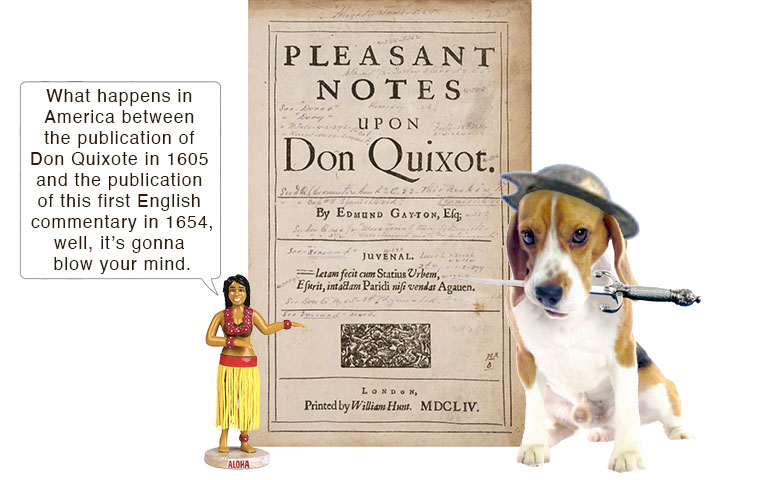The dew lies softly on the green grass and the sunrise is golden in the early morning sky. I come upon an unspoiled mirror of water. A smooth pebble leaves my fingertips. Yes! I land my pebble perfectly in the bullseye! I watch a concentric circle of ripples reach the edge of the pool and bounce back to the middle where they collide.
I wander on.
Who knows why we do what we do?
I was contemplating Quixote, that strangely enchanting character created by Miguel de Cervantes in 1605.
But what was happening across the water in 1605?
Having a keyboard at my fingertips, I took an early morning walk backwards-in-time to see what was happening in America while the tormenters of the Inquisition were torturing the innocent people of Spain and wooden blocks were stamping the first edition of Don Quixote onto paper in Madrid.
1607: Jamestown, the first permanent settlement by England, was founded on the shores of what would later become Virginia.
1610: John Rolfe realized he could introduce the tobacco of the Native Americans to the people of Europe. Praise God! This would be the crop that would provide the income that would sustain our little colony on the sparkling shores of this brand-new world.
1615: Miquel de Cervantes writes Part Two of Don Quixote, and more characters are carved into wooden blocks to stamp ink onto paper in Madrid.
1619: Four thousand Europeans agree to work as indentured servants for a few years in the tobacco fields of Virginia if someone will loan them the money for passage across the Atlantic and give them fifty acres of their own. Among these 4,000 men are Anthony Johnson and 19 other young men of Africa. Each of them work in the tobacco fields to pay off the loans for their passage, then each is awarded 50 acres of his own. Anthony Johnson later becomes successful enough to pay for the passage of 5 more Africans to help him work his land.
1650: Thirty-thousand people are working in the tobacco fields of Virginia, including about 300 Africans. Everything seems to be running smoothly and everyone is prospering.
1654: Edmund Gayton writes the first commentary in English about Don Quixote. The book is published by William Hunt in London, titled, “Pleasant Notes upon Don Quixot.” Later that same year, slavery is introduced to North America when Anthony Johnson convinces the court of Northampton County that he is entitled to the lifetime services of John Casor. This would be the first judicial approval of life servitude, except as punishment for a crime.
As I return from my morning walk, I discover catastrophic chaos raging in the pond. The ripples that bounce off the shores of the pond result in unintended collisions and consequences as all sense of symmetry disappears.
Some people say only about 3,000 people were executed by the Spanish Inquisition. Other people say it was more like 30,000. No one has ever claimed it was 300,000. But the pebble of tobacco tossed by John Rolfe killed more than 100,000,000 people in the 20th century alone. We can only guess at the number killed by lung cancer and emphysema during the previous two centuries. Tobacco continues to kill about 8 million people a year.
The pebble of slavery tossed by Anthony Johnson resulted in the subjugation of millions of innocent people in America for exactly 201 years. And the waves of that storm continue to crash upon the beach 161 years after the Emancipation Proclamation of Abraham Lincoln.
Anthony, Anthony, Anthony… why did you throw that pebble 370 years ago?
Anthony, if you are listening, please know that you are remembered as a hardworking and successful man who lived with his loving wife Mary for more than 40 years and was admired by everyone. You have been called the patriarch of a very successful community of 300 African-American families who prospered in Virginia during the days when America was new. But after you died in 1670, your plantation was not inherited by your children, but was given to a white colonist when a judge ruled that you were “not a citizen of the colony” because you were black.
As I finish my early morning walk backwards-in-time, I hear in my head a sad sigh, and the voice of Kurt Vonnegut saying, “And so it goes.”
Yes, Kurt, and so it goes.
Roy H. Williams
 “Never quit on your worst day.” That’s Lesson #1. It’s easy to remember and it’s valuable advice. But the story behind lesson #1 is what makes the lesson magical. Lesson #2 is equally insightful. “You can’t score goals if you’re not on the field.” Phebe Trotman retired as a soccer superstar to become a superstar business coach. The characteristics required to lead a championship soccer team are identical to those required to lead a championship team in business. Phebe Trotman is about to tell young Maxwell Rotbart everything he needs to know. Listen in, and Win! MondayMorningRadio.com
“Never quit on your worst day.” That’s Lesson #1. It’s easy to remember and it’s valuable advice. But the story behind lesson #1 is what makes the lesson magical. Lesson #2 is equally insightful. “You can’t score goals if you’re not on the field.” Phebe Trotman retired as a soccer superstar to become a superstar business coach. The characteristics required to lead a championship soccer team are identical to those required to lead a championship team in business. Phebe Trotman is about to tell young Maxwell Rotbart everything he needs to know. Listen in, and Win! MondayMorningRadio.com
